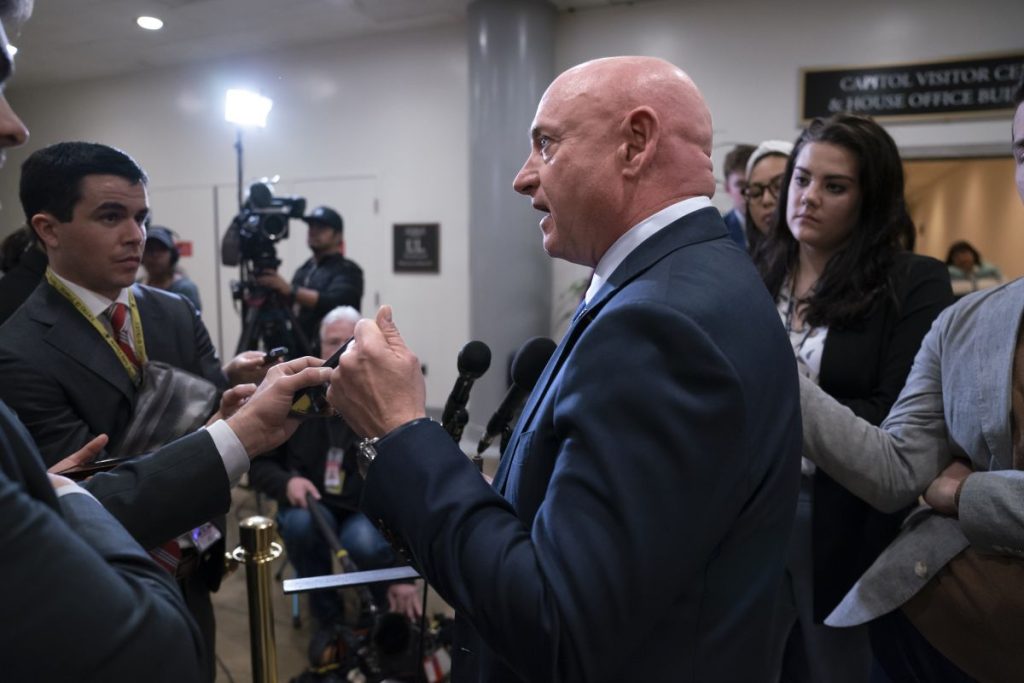Congress floats ways to secure skies after Chinese balloon
By STEPHEN GROVES Associated Press
WASHINGTON (AP) — As the only current U.S. senator to have visited space, Mark Kelly knows something about unexplained objects in the skies.
FILE – Sen. Mark Kelly, D-Ariz., speaks with reporters following a classified briefing on China, at the Capitol in Washington, Feb. 15, 2023. Senators are investigating how the suspected Chinese surveillance balloon was allowed to pass over crucial missile sites. Kelly is a former astronaut. He wants to require weather balloons to carry a radar transponder. (AP Photo/J. Scott Applewhite, File)
Back in his aviator days, Kelly saw Mylar party balloons fly by his cockpit. And once when he was piloting a NASA aircraft, he spotted an object at roughly 45,000 feet (13,700 meters) — much higher than commercial airplanes fly — that he couldn’t identify by sight.
He’s not sure he would want to see American missiles flying at those objects, either.
“I don’t think we want to get into the business of launching AIM-9Xs — at $400,000 a pop — at weather balloons,” Kelly told The Associated Press, referring to the heat-seeking, air-to-air missiles used in recent weeks to shoot down a series of aerial objects, including a suspected Chinese surveillance balloon.
The Biden administration’s unprecedented peacetime downing of the Chinese balloon and three other objects has raised new and troubling questions about the security of American airspace, alarming lawmakers who fear the episode has exposed a vulnerability that could be exploited by other foreign adversaries.
While the House and the Senate both voted unanimously to condemn China’s ruling political party for the incursion and largely supported the Biden administration’s decision to shoot down the balloon, they have questions about what’s next.
Sen. Jon Tester, a Montana Democrat who has been tasked with heading up an investigation into how the suspected Chinese surveillance balloon was allowed to pass over crucial U.S. missile sites, said that he would ensure the Defense Department has funds for a protocol to assess the threat of unidentified flying objects.
“We’re going to get to the bottom of what happened and make sure we have a plan going forward to detect and then find out what potential problems this balloon may cause and then a way to bring it down that doesn’t cost us a $400,000 missile,” Tester, who chairs the Defense subcommittee on appropriations, told Fox News Channel.
Concerns over China, which has criticized the U.S. for “an obvious overreaction,” and worries about interference with civilian aircraft are shared by members of both political parties, creating the potential in Congress to mount a robust bipartisan response. But lawmakers are also mindful of adding yet more military costs — the U.S. already spends more than $800 billion yearly on defense programs — and are wary of expensive shooting sprees for every random object that appears in America’s skies.
Kelly, an Arizona Democrat, is working on legislation that would require weather balloons to carry transponders that could communicate with air traffic control systems to separate research balloons from mysterious objects where “we don’t know what that is. We don’t know where it came from.”
“It would really help the Defense Department to be able to sort out what is civilian science payload, what’s a weather balloon, what’s a NASA balloon, what’s a private company in the United States doing, what might be even a U.S. military,” said Kelly, who logged 54 days in space as an astronaut before jumping into politics.
Other lawmakers have launched a flurry of proposals aimed at the skies including a comprehensive examination of encounters with unidentified aerial objects as well as an investigation into how the military is tracking objects floating over the country.
President Joe Biden has said the military is developing “sharper rules” to track, monitor and potentially shoot down unknown aerial objects. He has justified the downings by saying the objects presented a remote risk to civilian planes.
But the four missile attacks were the first known peacetime shootdowns of unauthorized objects in U.S. airspace. Officials now say the three later objects shot down likely had a “benign purpose” and were detected after the U.S. military set its radar systems to detect slow-moving balloons.
China’s alleged practice of using balloons for surveillance exploits a potential oversight in air traffic control systems, Kelly said. The systems aren’t designed to track the thousands of objects that move in on high-altitude winds.
The National Weather Service alone launches roughly 60,000 balloons every year to monitor for extreme weather. Universities, government organizations and even ham radio hobbyists send up thousands of others.
“This is about whether an adversary has developed a capability that they know we’re not looking for because our systems are set up to see missiles and airplanes. They’re not set up to see smaller objects at lower altitudes,” said Sen. Marco Rubio of Florida, the top Republican on the Intelligence Committee, who is pushing for the recent encounters to be included in a wider government study of “unidentified aerial phenomena” — better known as UFOs, short for unidentified flying objects.
Rubio, along with Democratic Sen. Dianne Feinstein of California, also jumped on the opportunity to renew a proposal to create the Space National Guard.
“China has fused its commercial, military and technological applications in ways no other nation ever has,” Rubio told reporters. “So it’s a multifaceted challenge and one that will require a comprehensive, long-term and committed response.”
But the bills face uncertain paths to becoming law.
As senators were clued in to the origins of the objects shot down this month, some appeared ready to move on. Sen. Lindsey Graham, a South Carolina Republican, quipped about aliens and said “there’s just a bunch of junk up there.”










